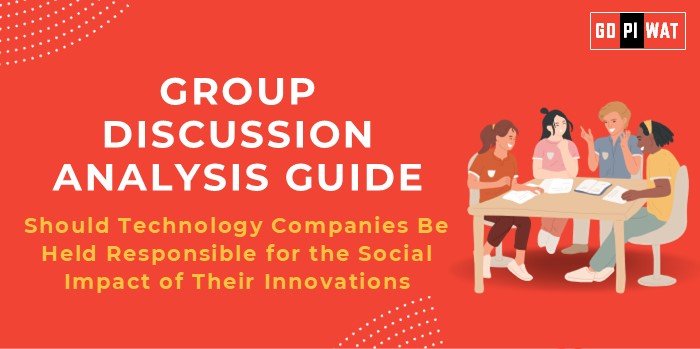📋 Group Discussion (GD) Analysis Guide
🌐 Should Technology Companies Be Held Responsible for the Social Impact of Their Innovations
🌟 Introduction to the Topic
Opening Context: “Technology companies have transformed every facet of life—from how we communicate to how we learn. However, these advancements often come with unintended social consequences, raising questions about corporate accountability in the digital age.”
Topic Background: Historically, innovation has been celebrated for driving progress. However, recent controversies, such as the misuse of AI tools and social media platforms fueling misinformation, highlight the need for ethical considerations in technological development.
📊 Quick Facts and Key Statistics
- 🌍 Global Internet Users: 5.4 billion (2024) – Reflecting the pervasive reach of technology globally.
- 🤖 AI-Driven Job Automation Risk: 40% of jobs globally are at risk by 2035 (WEF) – Highlighting potential societal disruption.
- ⚠️ Social Media Misinformation Cases: Increased by 33% from 2021 to 2023 (Pew Research) – Demonstrating the ethical challenges faced by platforms.
- 💰 Tech Company Fines: Over $9 billion in fines for GDPR violations (2024) – Indicating increased regulatory scrutiny.
👥 Stakeholders and Their Roles
- Technology Companies: Innovators and implementers of cutting-edge solutions, bearing the responsibility for ethical foresight.
- Governments: Regulators ensuring legal compliance and societal well-being.
- Users: Beneficiaries of innovation but also at risk of exploitation or harm.
- NGOs: Advocates for accountability and social responsibility.
🏆 Achievements and Challenges
- Achievements:
- 📈 Economic Growth: Technology contributes 16% to global GDP.
- 💉 Healthcare Innovations: AI revolutionizing diagnostics, such as IBM’s Watson aiding in cancer treatment.
- 🎓 Education Accessibility: E-learning platforms like Coursera democratizing access to knowledge.
- 🌐 Global Connectivity: Over 85% of the world now has mobile coverage.
- Challenges:
- 🔒 Data Privacy Concerns: Cambridge Analytica scandal exposed vulnerabilities in personal data handling.
- 📰 Misinformation Epidemic: Facebook and Twitter faced backlash for election interference.
- 📉 Digital Divide: Access to technology remains unequal, with rural areas lagging significantly.
🌍 Global Comparisons
- Europe: Robust GDPR enforcement for user privacy.
- China: Advanced but tightly regulated AI usage with strong government oversight.
📚 Case Studies
- AI Misuse in Hiring: Studies revealed algorithmic biases leading to discriminatory hiring practices.
🗣️ Structured Arguments for Discussion
- Supporting Stance: “Technology companies, as beneficiaries of societal trust, must shoulder responsibility for mitigating harm caused by their innovations.”
- Opposing Stance: “Innovation thrives on creative freedom; placing excessive responsibility on companies could stifle progress.”
- Balanced Perspective: “A collaborative approach where tech companies, governments, and users share responsibility is essential for sustainable innovation.”
💬 Effective Discussion Approaches
- Opening Approaches:
- 💡 “While technology bridges gaps, it also widens inequities, making corporate responsibility critical.”
- 🤖 “The rise of AI tools has transformed industries but also amplified ethical dilemmas.”
- Counter-Argument Handling:
- “While regulatory constraints can slow innovation, self-regulation by companies, as seen in Google’s AI Ethics guidelines, offers a balanced solution.”
📈 Strategic Analysis of Strengths and Weaknesses
- Strengths: Promotes accountability; aligns innovation with ethical standards.
- Weaknesses: May deter small startups; challenges in defining accountability.
- Opportunities: New roles for ethicists in tech; enhanced public trust.
- Threats: Global inconsistencies in regulations; potential innovation barriers.
📌 Connecting with B-School Applications
- Real-World Applications: Use cases in ethical AI, sustainable tech development.
- Sample Interview Questions:
- “What role should ethics play in AI development?”
- “How can companies balance profitability with social responsibility?”
- Insights for B-School Students:
- Incorporate ethical frameworks in projects.
- Focus on stakeholder collaboration for innovation.


